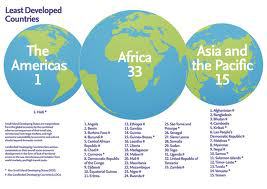Why extending the LDC’s TRIPs transition period is inevitable
- paulogendi |
- May 28, 2013 |
- CIPIT Insights,
- TRIPS

The US and the European Union have lost the war. They cannot stand against the army of supporters backing the least developing countries (LDCs) to have the Trade Related Aspects of Intellectual Property Rights (TRIPS) Agreement transition period extended.
The deadline for transitioning is fast approaching on 1 July 2013 for TRIPS Agreement generally and 1 January 2016 for pharmaceutical patents. If the deadlines are not extended, the whole world is expected to be TRIPS-compliant effectively marking a new era of intellectual property rights (IPRs) globalization guided by the minimum standards set under the TRIPS Agreement.
The world is fast moving from commodity- to knowledge-based economies. Innovations and technology are attracting more investments than ever before. Their contributions to the economies of various countries are also significant. It is, therefore, perfectly understandable why trade aspects of IP are slowly achieving a near ‘rock-star’ status under international law and trade discourse.
Unfortunately, the balance is tilted in favour of the West and the so-called developed countries economies that currently control the bulk of innovations and technology in almost all sectors of the world. The developing countries and LDCs are therefore spectators in this big party. Their role is reduced to protection and enforcement. Occasionally, the demands made by developed nations are very unfavourable and unfair as exemplified by the issue at hand.
In December 2011, the 8th Ministerial Conference recommended to the TRIPS Council an LDC extension. Based on this recommendation, Haiti, acting within its rights under the TRIPS Agreement and other derivative instruments including the Doha Declaration, submitted an application to the TRIPS Council, on behalf of 49 LDCs. The application called for an unconditional extension of the transition period.
However, as expected, Haiti’s application on behalf of LDCs has encountered strong resistance from the developed economies and particularly from the West. As a concession, however, the West is, in principle, adamant that any extension, if granted, must be conditional. In particular, it must be on a short term basis of a fixed period of about five years. Secondly, the extension should contain a no ‘roll-back’ clause in its text. A no ‘roll-back’ clause is aimed at maintaining the current levels of IPRs protection in each and every LDC whether or not an obligation exists at the international level.
The problem with the above conditions are two-folds. First, it is near impossible for all LDCs to be graduated by the Committee for Development Policy (CDP) under the UN Economic and Social Council (ECOSOC) in five years to legitimately provide IP protection as advocated for under the TRIPS. This is because the CDP uses objective criteria including income levels, human assets and economic vulnerability effectively denying the LDC transitioning to developing countries a strict timeline. This is, in my opinion, a good justification for an unconditional extension.
Secondly, a no ‘roll-back’ clause is first and foremost illegal since it seeks to deny LDCs the benefit of TRIPS Agreement flexibilities. The TRIPS Agreement flexibilities are useful for addressing major development challenges faced by LDCs on a daily basis and if denied may have tremendous consequences on the ability of LDCs to develop. In short, a no ‘roll-back’ clause makes nonsense of the extension in the first place.
Another important factor that must be appreciated is that most intellectual property laws ‘illegally’ enacted by LDCs are colonial. The advent of the TRIPS Agreement marked a new era of balancing IP norms with flexibilities aimed at cushioning developing countries and LDCs. The flexibilities are therefore a right and not a privilege as explained under the Doha Declaration. No conditions can therefore be legitimately given to deny such crucial rights.
In conclusion, the conditions set by the developed economies cannot be justified. They are unfounded both under international law and morality. The TRIPS Council must therefore dismiss them and grant LDCs an unconditional extension to their request. This should not be based on specific timelines of about five years as proposed by developed economies but it should be based on a countries’ graduation from LDC to developing country status. Finally, it is encouraging to witness the solidarity amongst the LDCs together with developing countries, civil society organizations (CSOs), academicians and major UN bodies on this issue.
